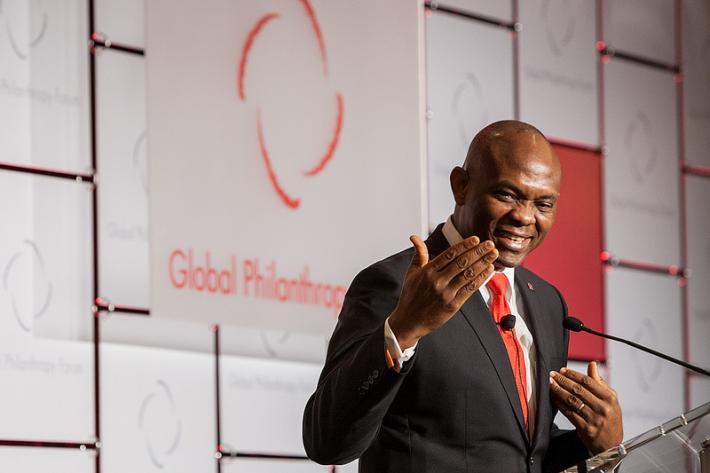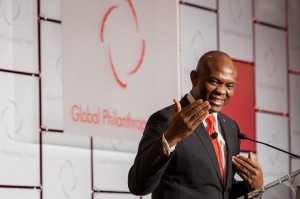Here is an article by renowned businessman Tony Elumelu, which appeared as a guest post on the Financial Times’ beyondBRICs website . In it, he outlines three main requirements for creating and sustaining economic growth in Africa. Enjoy this insightful piece.
Africa’s growth continues to make headlines at home and abroad. But while the continent has made impressive gains at a macro level, those gains have been slow in creating jobs and wealth at a local level.
More needs to be done, and soon, if Africa’s growth is to be sustained, and Africa is to reach its true economic potential. Talk of a demographic dividend, is in reality a wakeup call for politicians and the private sector, bringing with it considerable social, economic and environmental challenges.
Clearly the continent is not lacking for opportunity. Walmart’s purchase of MassMart of South Africa is testament to Africa’s growing consumer appetites and resources, as are the shopping malls being constructed across the continent. Africa is not lacking for entrepreneurship. As a long term proprietary investor, every day I see first-hand how determined and industrious African entrepreneurs are to be successful.
I have been a strong proponent of an idea I call “Africapitalism“, which refers to the need for Africa’s private sector to take the lead in development. I believe that private sector enterprises can solve more of Africa’s social and economic challenges than development bank initiatives, aid incentives, or relief programmes. Private sector solutions are also more sustainable – creating jobs, raising living standards, and building wealth in local communities, thereby addressing a host of issues, from food security to healthcare to education.
As someone who believes passionately in the potential of Africa, and someone who actively invests in businesses of all stages – from start-ups to conglomerates – I would argue that the most important initiatives for expanding entrepreneurship and economic progress in Africa are not the obvious ones. Most certainly the answer is not just “more money”. Experience teaches us that simply pumping more aid and development money into Africa has not created sustainable development at the local level. We must focus on long-term investment that supports greater entrepreneurship and a thriving, competitive private sector. How do we accomplish this goal?
First, the most effective growth trigger is intra-African trade. Historically Africa has not done much business with itself. Take the booming horticulture industry in Kenya as an example. Flowers are exported to Holland and then re-imported into Africa. The same is true of Nigeria’s raw petroleum exports, which are refined elsewhere and then re-imported as petrol and other finished products. Africa needs to develop capacity to manufacture and refine value-added products that can be sold across the continent.
Rapid increases in internal trade would build Africa’s manufacturing sector and promote the growth of well-paying jobs, as well as lowering costs for consumers, and conserving capital within the region for reinvestment. It has the added benefit of increasing mobility of labour, capital and innovation.
The key message here is: If you are already doing business in Africa, then you should be looking to do business within Africa. Not only will it build the productive power of African economies, it will also increase the purchasing power of African people – flowing right to the bottom line of early-adopters by fuelling growth.
Second, one of the scarcest commodities in Africa is management skill. Donor funding to address issues like healthcare is relatively easy to find, compared to the almost complete lack of funding for management training. Yet, skilled professional managers are essential to the proper functioning of both the private and public sectors. Philanthropists, NGOs and multi-national companies may all better achieve their objectives by putting more resources into building Africa’s pool of managerial talent.
Third, we need a wholesale shift in thinking among investors. The kind of capital Africa requires is more long-term and skews more towards equity or mezzanine structures, rather than debt financing. Providers of capital inside and outside of Africa also need to have a good understanding of the risk involved and are willing to take on that risk with a long-term view. Governments across the continent are making great strides in ensuring stable, transparent, efficient markets in which business can operate. It is up to businesses and investors to take advantage of these reforms – and that includes African investors, who too often have felt that their money was safer in Europe or America. I believe that those who make long-term equity commitments to the region will see the greatest returns as Africa’s growth continues in the coming decades.
These three structural impediments are some of the biggest barriers to entrepreneurship that I encounter in my work as an investor. But I am optimistic that even small headway in these areas can have an enormous impact. As a former banking executive I have seen first-hand how fast African markets can grow when you deliver the right products and services. That is what enabled us to build United Bank for Africa from a single-country bank into a pan-African financial institution with more than 7m customers operating in more than 20 countries, inside and outside Africa.
These may not be the most obvious priorities for those thinking about how to solve Africa’s social and economic problems. I can say from experience, however, that these are some of the most effective ways to promote private sector growth. And that is the true path to economic self-reliance for Africa – a continent that yearns to fully exercise its entrepreneurial muscle.
Tony Elumelu is an entrepreneur, a philanthropist and the chairman of Heirs Holdings Limited, a pan-African proprietary investment company. He is former Group CEO of United Bank for Africa and current Chairman of Transcorp. He can be found on Twitter at @TonyOElumelu.



